The Dubai Food Scene Has Never Been Hotter
A wave of homegrown, chef-led restaurants makes Dubai one of the most compelling places in the world to eat right now.
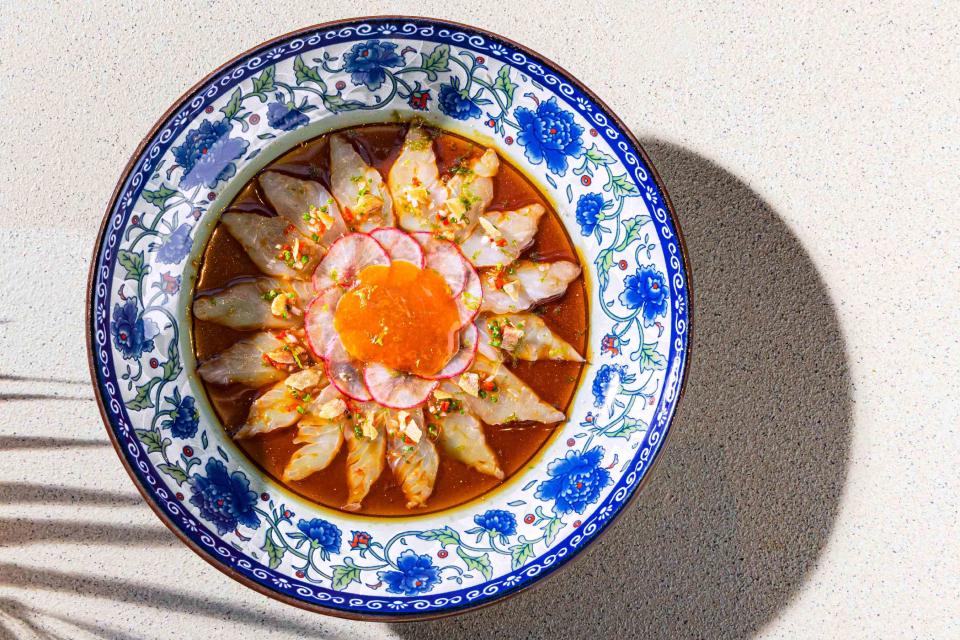
Courtesy of Jun's
It’s the silence that strikes me the most. Dubai may be many things, but quiet is not typically one of them — the glittering metropolis that erupted from the desert like diamonds from sand is a loud testament to superlatives. But everything about Moonrise lands softly: the stillness of a deserted stretch of town, where I’m convinced the Uber driver has left me in the wrong place. The serene rooftop location of a residential tower, overlooking a less clamorous downtown view. And the emerald-tiled kitchen where I watch the hushed pageantry of chef Solemann Haddad and his team, swirling wordlessly around each other.
At Moonrise, which opened in September 2021, the flavors make all the commotion. Japanese techniques dance to Middle Eastern rhythms in Haddad’s unique take on omakase, where combinations that read incongruously on a menu make perfect sense on my palate. There’s a cylinder of seaweed-encircled rice topped with a delicate slice of tuna belly that’s been brushed with local dates and honey. A silken mound of yuzu-steeped stracciatella that’s sprinkled with pomegranate molasses and nestled in a bowl of miso muhammara practically demands to be scooped up with a fluffy disk of charcoal khubz (flatbread). Hamachi crudo floats in a sumac and citrus ponzu broth brightened with a jolt of za’atar oil. And then there’s my favorite: fiery hamachi tartare with a bracing hit of shatta, a Syrian fermented chile sauce.
This is a meal that could only exist in Dubai, and that’s the point. “I like to say that we are the culinary manifestation of Dubai — there’s a lot of Japanese, a lot of Middle Eastern, a lot of this, a lot of that,” says Haddad, who is half-Syrian and half-French and was born and raised in Dubai. “Our cuisine is 50% Middle Eastern, 50% Japanese, but 100% Dubai.”
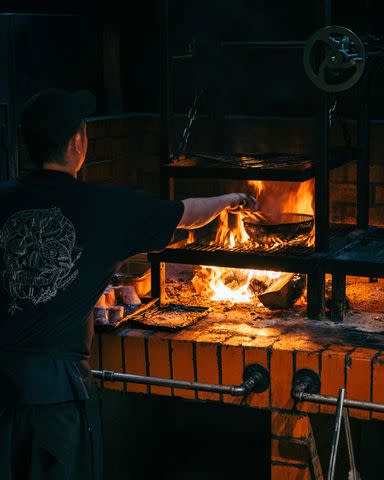
John Marsland
After years of flyby visits, I moved to Dubai in 2021 armed with a long list of recommendations of Zumas and LPMs and Hutongs — the likes of which I could find back home in New York — as well as shawarmas at a few dirhams a pop. But I was most interested in finding restaurants that fell in between, into that liminal realm between high-end and low-budget, where both ambitious chefs and clever design reign, the places saved for promising dates or friends you want to impress with your culinary acumen.
For a long time, Dubai menus followed a reliable formula: some sushi, some pizza, some burrata, lots of truffles. But more recently, my best dining experiences have unfolded not in the celebrity-chef-branded dining rooms of the city’s gilded palaces, but at a long-overdue new wave of inventive, homegrown, chef-centric eateries cascading over Dubai. With the diversity of the expat-driven city, chefs and diners alike are bringing their cosmopolitan tastes to the table.
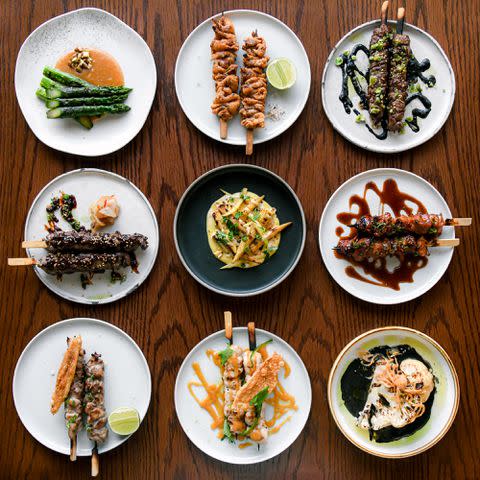
Courtesy of Reif Kushiyaki
Related: One of the World's Most Picturesque Meals Is in the Dubai Desert
“We’re not the same people we were 10 years ago,” says Mohammad Orfali, who opened the convivial bistro Orfali Bros with his brothers, Wassim and Omar, in 2021. The dishes showcase their Syrian heritage animated with flavors they’ve embraced along the way, such as their shish barak a la gyoza, Wagyu beef dumplings atop thick waves of garlic yogurt laced with sujuk oil and pine nuts. “When I did my first homegrown concept 15 years ago, it didn’t work. But people are more educated about food. They’re innovative; they’re young; they’re flexible,” Orfali says.
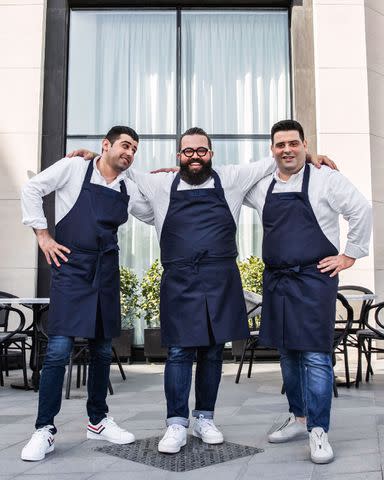
Courtesy of Orfali Bros
When Samantha Wood, a British-Greek-Cypriot food writer and consultant, arrived in the city 23 years ago, “Dubai hardly had a culinary scene,” she remembers. Slowly, local eateries began to hold their ground — and the pandemic accelerated the trend. “It’s been brought to the fore over the last two and a half years with the support-local movement,” she says. “This shift is a sign of a matured restaurant scene that draws similarities with global food cities like New York and London.”
Another indicator that Dubai’s food scene is maturing: the attention of organizations dispensing accolades. Last year saw the kickoff of the inaugural World’s 50 Best Restaurants’ Middle East and North Africa list in February, followed in June by the Michelin Guide’s first foray into Dubai. European stalwarts like Niko Romito, Yannick Alléno, and José Avillez received Michelin honors for their Dubai outposts, while three homegrown restaurants got a nod: Akmal Anuar’s 11 Woodfire and Himanshu Saini’s Trèsind Studio. (Haddad took home a Michelin Young Chef Award for Moonrise.)
On a sultry Monday night in August, when most of the city’s residents have escaped for cooler climes and tourists are deterred by the oppressive heat, there’s still a lively hum in the air at 11 Woodfire. Here, Anuar coaxes complex flavors out of his wood-fired oven: soy-glazed bone marrow scattered with curry leaves, a bone-in rib eye cooked flawlessly, and the best burger I’ve had in the city, draped with Gouda, mushrooms, and sriracha.
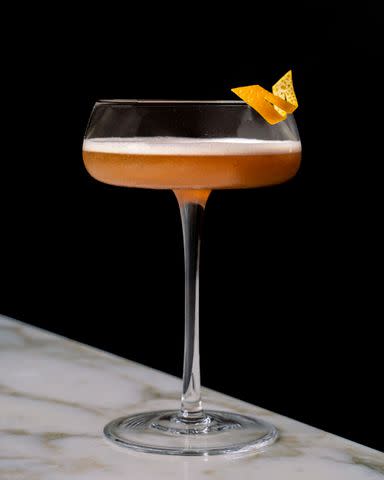
Courtesy of Moonrise
“Dubai is still very, very young in terms of restaurants — way younger than New York, Singapore, and Hong Kong,” Anuar says. “It’s not fat enough; it’s not meaty enough. You don’t really have celebrated, born-here, built-from-nothing empires.”
Related: Acclaimed Chef Alexander Smalls Opens the World's First African Food Hall
Some would argue Anuar is laying the foundation for such an empire. The son of Singaporean hawkers, he was the mastermind behind one of the first local concepts that truly took off in Dubai: 3Fils, which opened in the unlikely setting of Jumeirah Fishing Harbour in 2016. Less than six months after he opened 11 Woodfire in early 2022, Anuar caught Michelin’s eye. “They told me, ‘In 100 years, you’re the first [starred] restaurant that’s halal and serves no alcohol,’” he says. “I can represent this restaurant as a proud Muslim.” Last June, Anuar opened a modern Asian restaurant, 53 in Manhattan. Could this be the start of a trend of Dubai chefs being wooed to food capitals around the world?
Whatever lies ahead, I’d argue Dubai is one of the most interesting places to eat in the world right now — in some ways, mirroring the mind-bending growth of the city itself. “I feel like the food scene is going through what Dubai went through in the last 40 years,” says Haddad. “It’s just rapid growth, a thousand kilometers an hour, done fast but without compromise.”
Where to Stay
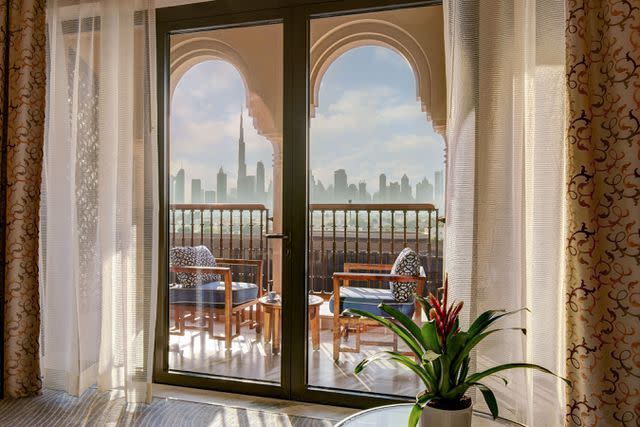
Courtesy of Four Seasons Resort Dubai at Jumeirah Beach
25hours Hotel One Central
Dubai’s most irreverent hotel has 434 rooms brimming with color and clever references to Emirati culture—and many have views of the sinuous silhouette of the city’s newest landmark, the Museum of the Future. (Rooms from $225)
Four Seasons Resort Dubai at Jumeirah Beach
This seaside retreat has all the trappings of a resort—idyllic gardens, serene spa, palm-shaded pool—alongside the city’s hottest tables, from glamorous 1920s-Osaka-inspired Mimi Kakushi to lively beach bar Nammos. (Rooms from $668)
Atlantis the Royal
Celebrity chefs like José Andrés, Heston Blumenthal, and Gastón Acurio opened outposts at this long-awaited resort—and Nobu Matsuhisa debuted his first-ever beach restaurant. (Rooms from $4900)
Where to Eat
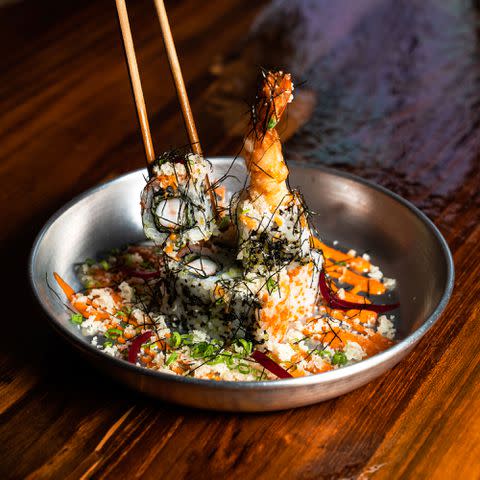
Courtesy of 3Fils
Orfali Bros
Come for the bold flavors of the brothers’ hometown of Aleppo, Syria, blended with Japanese, Mexican, Turkish, and Chinese accents; stay for the jewel-box-like pastry display.
Kinoya
When the pandemic paused chef Neha Mishra’s popular supper club, she brought her flavorful bowls of ramen to a brick-and-mortar izakaya. Next up: an outpost at Harrods in London in 2023.
3Fils
The Japanese-inspired restaurant often credited with kick-starting the homegrown movement across Dubai, 3Fils opened the sweets-centric Brix next door in 2020, with six-course dessert menus.
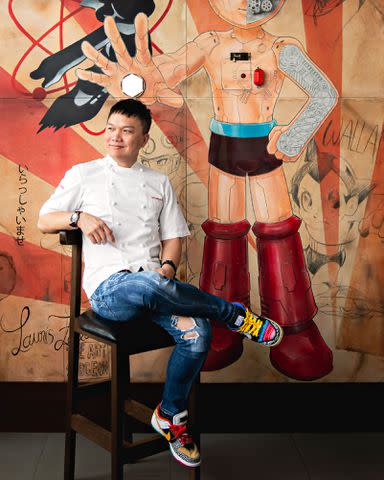
Courtesy of Reif Kushiyaki
Trèsind Studio
With restaurants from every corner of India, it’s hard to impress Dubai’s sizable Indian population, but chef Himanshu Saini’s Trèsind Studio dazzles with a 16-course experimental tasting tour of the subcontinent.
Jun’s
Chef Kelvin Cheung moved to Dubai after stints in Canada, the U.S., and India. At Jun’s, he shares with patrons the personal stories behind his modern takes on nostalgia- driven Asian–North American comfort food.
Moonrise
An ambitious young chef aims to define a Dubai culinary vernacular through Japanese and Arab ingredients.
11 Woodfire
Chef Akmal Anuar’s culinary triumph is a temple to wood-fired fare—from Wagyu kebabs to leeks with grapefruit, yam, and dill, and an inventive mocktail menu to boot.
Three
A tony stretch of the Jumeirah district is filled with villas converted into trendy new cafés. This one, by local TV personality Eva Halasa and her two daughters, has a delectable brunch menu with modern twists on Jordanian flavors.
Reif Kushiyaki
Singaporean chef Reif Othman’s Wagyu katsu sando has an ardent following in Dubai. Also not to miss: TERO (The Experience by Reif Othman), a four- seat omakase dinner served at the restaurant’s bar.
For more Food & Wine news, make sure to sign up for our newsletter!
Read the original article on Food & Wine.

